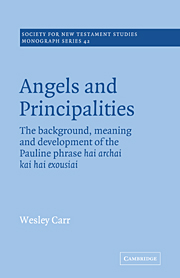 Angels and Principalities
Angels and Principalities Summary
One of the most influential books for the study of the New Testament in the twentieth century has undoubtedly been Die Geisterwelt im Glauben des Paulus, which Martin Dibelius published in 1909. He himself owed much to a slimmer volume from Otto Everling, Die paulinische Angelologie und Dämonologie (1888). Both authors attempted to establish that a world dominated by supernatural forces was central to Paul's thought; that these forces were hostile to mankind; and that this was the context within which Paul worked out his thinking on man's existence and the work of Christ. Although not the first to deal with this subject, Everling and Dibelius are mainly responsible for the centrality of these notions in the study of Pauline theology today.
In Britain there was less interest in the subject. J. S. Stewart in 1951 described it as ‘a neglected emphasis’ and G. H. C. Macgregor developed the idea in his stimulating address to the Studiorum Novi Testamenti Societas in 1954. The books of Everling and Dibelius were never translated into English. Those of Oscar Cullmann, however, were, and they exercised a wide influence in the world of scholarship. Both in The State in the New Testament (1957) and Christ and Time (ET 1951, revised 1962) these principalities and powers were given a central place in his dogmatic scheme.
- Type
- Chapter
- Information
- Angels and PrincipalitiesThe Background, Meaning and Development of the Pauline Phrase hai archai kai hai exousiai, pp. 1 - 4Publisher: Cambridge University PressPrint publication year: 1981


